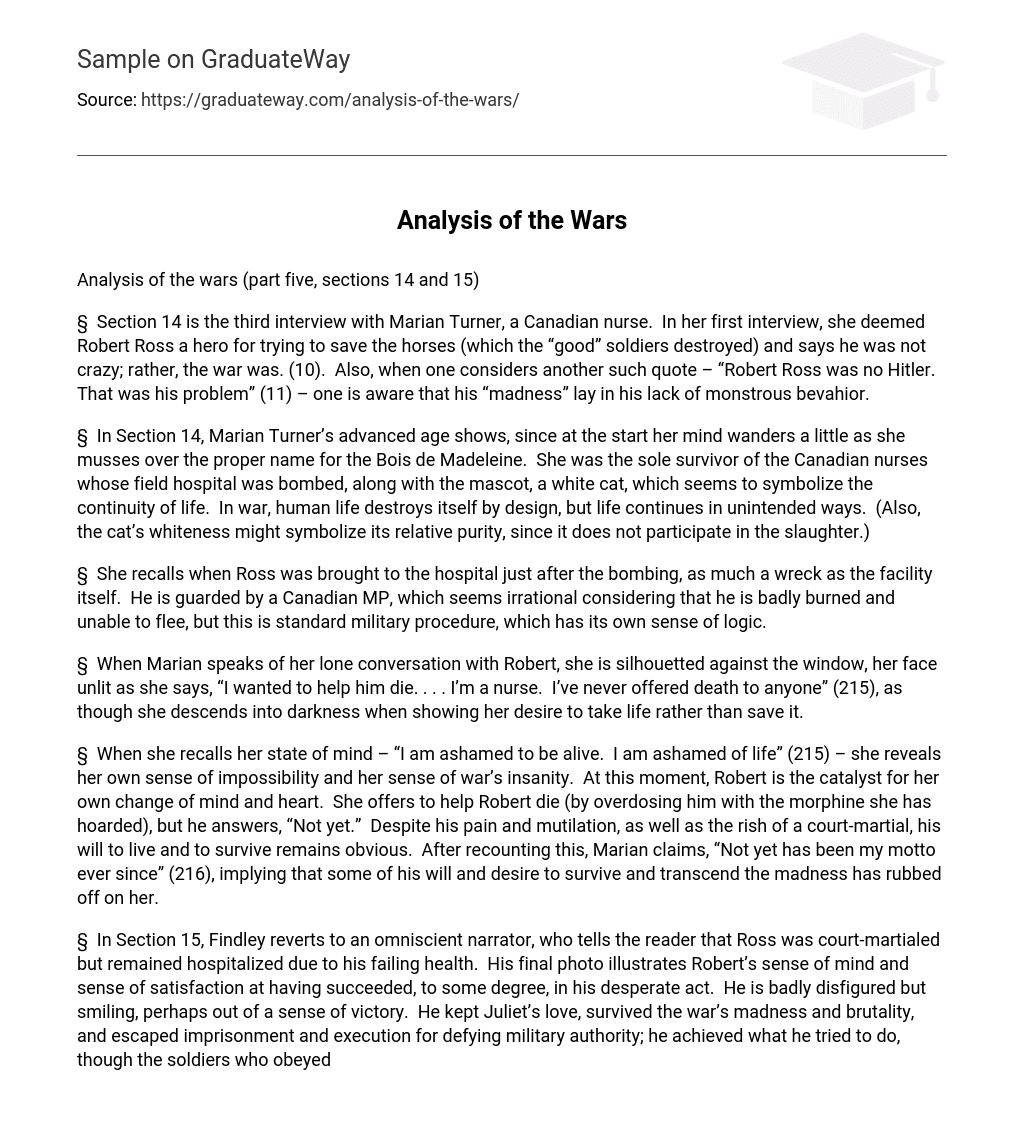Analysis of the wars (part five, sections 14 and 15)
§ Section 14 is the third interview with Marian Turner, a Canadian nurse. In her first interview, she deemed Robert Ross a hero for trying to save the horses (which the “good” soldiers destroyed) and says he was not crazy; rather, the war was. (10). Also, when one considers another such quote – “Robert Ross was no Hitler. That was his problem” (11) – one is aware that his “madness” lay in his lack of monstrous bevahior.
§ In Section 14, Marian Turner’s advanced age shows, since at the start her mind wanders a little as she musses over the proper name for the Bois de Madeleine. She was the sole survivor of the Canadian nurses whose field hospital was bombed, along with the mascot, a white cat, which seems to symbolize the continuity of life. In war, human life destroys itself by design, but life continues in unintended ways. (Also, the cat’s whiteness might symbolize its relative purity, since it does not participate in the slaughter.)
§ She recalls when Ross was brought to the hospital just after the bombing, as much a wreck as the facility itself. He is guarded by a Canadian MP, which seems irrational considering that he is badly burned and unable to flee, but this is standard military procedure, which has its own sense of logic.
§ When Marian speaks of her lone conversation with Robert, she is silhouetted against the window, her face unlit as she says, “I wanted to help him die. . . . I’m a nurse. I’ve never offered death to anyone” (215), as though she descends into darkness when showing her desire to take life rather than save it.
§ When she recalls her state of mind – “I am ashamed to be alive. I am ashamed of life” (215) – she reveals her own sense of impossibility and her sense of war’s insanity. At this moment, Robert is the catalyst for her own change of mind and heart. She offers to help Robert die (by overdosing him with the morphine she has hoarded), but he answers, “Not yet.” Despite his pain and mutilation, as well as the rish of a court-martial, his will to live and to survive remains obvious. After recounting this, Marian claims, “Not yet has been my motto ever since” (216), implying that some of his will and desire to survive and transcend the madness has rubbed off on her.
§ In Section 15, Findley reverts to an omniscient narrator, who tells the reader that Ross was court-martialed but remained hospitalized due to his failing health. His final photo illustrates Robert’s sense of mind and sense of satisfaction at having succeeded, to some degree, in his desperate act. He is badly disfigured but smiling, perhaps out of a sense of victory. He kept Juliet’s love, survived the war’s madness and brutality, and escaped imprisonment and execution for defying military authority; he achieved what he tried to do, though the soldiers who obeyed orders destroyed fifty horses. In ways, Robert has won a moral victory that appeared insane but only seems that way within the mad context of war, in which humanity is discarded.
§ The Epilogue provides a key to his motives for having stolen the artillery regiment’s two hundred horses in an effort to save their lives. It describes a photo of him in camp at Lethridge in 1915, before he and his regiment departed for Europe. In it, he sits amidst stacks of rifles and someone lying under a blanket in the background (looking dead though alive), holding a small mammal’s skull in his hand. The scene could be considered morbid because of the skull, weapons, and prone man under the blanket, and in this sense Robert sits amidst a scene of death. However, he is clearly alive. Nicholas Fagan’s quote – “Nothing so completely verifies our perception of a thing as our killing it” (218) – seems to provide an answer as to why he peformed his last act. Having killed and surrounded himself with death made him comprehend both death and life, and having taken life may have made him want to save it instead, realizing too late how precious it was. His final act thus appears insane within the context of war, where killing and following protocol are the norms, but within this deeper understanding, war is madness and preserving life the ultimate goal. This is reinforced somewhat in the final paragraph, describing a photo of Robert with his sister and their pony; he emerges from the book not as a traitor or a madman, but someone who defended life when war’s twisted logic forbade it.





